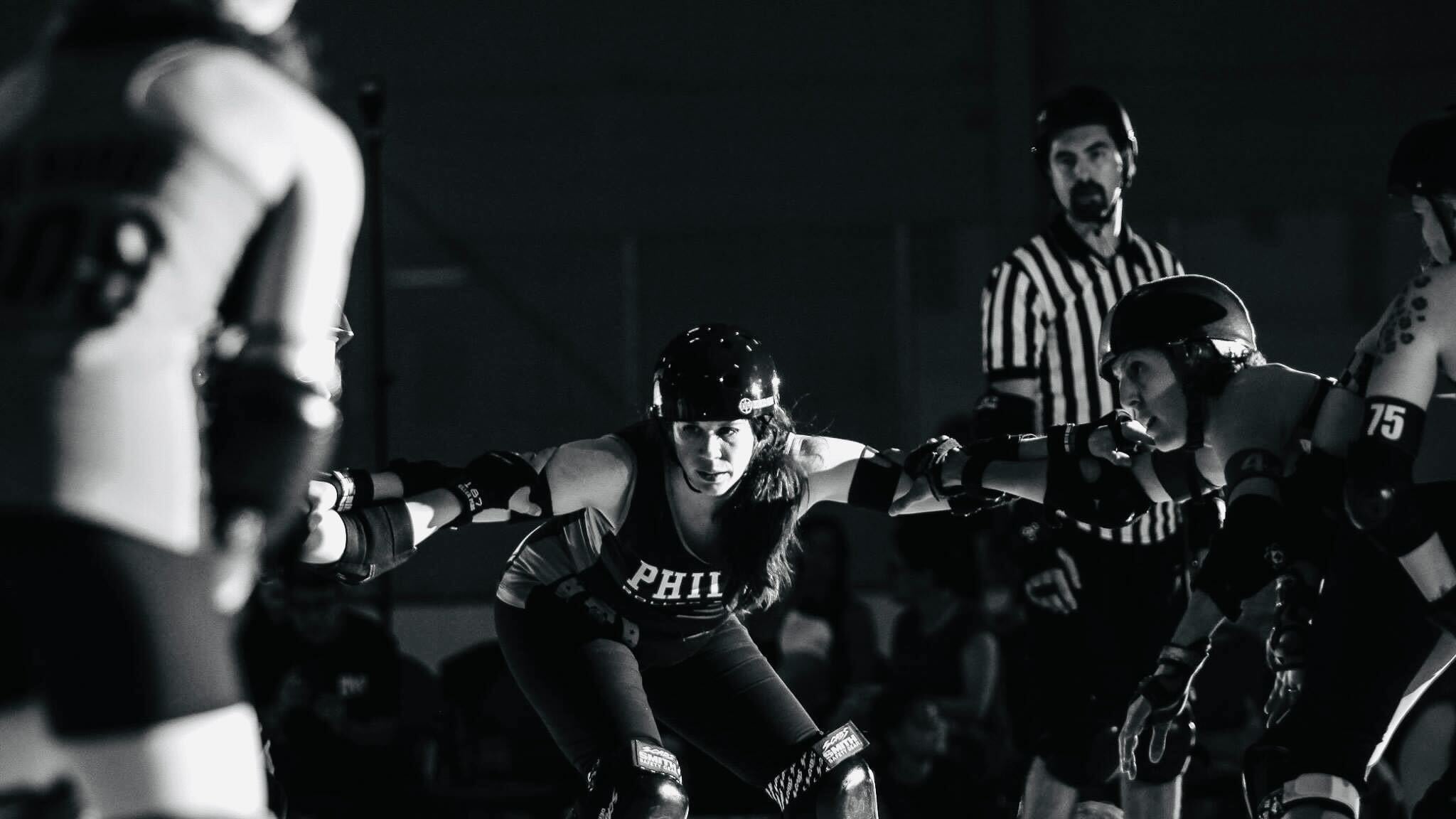Learning how to get up from a fall is the most important lesson in life and roller derby. Philadelphia writer and roller derby player Erica Vanstone shares how the sport taught her both ways to get back up in her upcoming memoir, Don’t Let Them Eat the Baby (Banana Pitch Press, 242 pages, $16). Vanstone appears Sunday, Nov. 3, at Powell’s City of Books to discuss the her memoir in conversation with Rose City Rollers executive director Kim Stegeman (aka Rocket Mean) and Banana Pitch Press founding editor (and WW contributor) Michelle Kicherer.
Vanstone’s own journalistic, detail-driven documentation is on display throughout Don’t Let Them Eat the Baby, an account of her time in roller derby from 2006 to 2021, padded by interviews with skaters and behind-the-scenes players. Her steadfast memoirist voice flows speedily as readers lap through chapters.
Tales whiz by at an upbeat, energetic tempo. Each of the concise 35 chapters opens with the definition of a roller derby term—“eat the baby,” for example, is when a jammer is knocked out of bounds, dragged backwards a full lap around the track, and captured by the opposing blockers, while pregnancies are called “nine-month derby injuries”—which educate and equip uninitiated readers to glide through stories. I wish I could say after 35 lessons I had a better understanding of how roller derby is played, but Vanstone didn’t set out to write a how-to.
Knowing little more about roller derby than Elliot Page’s 2009 movie Whip It based on Shauna Cross’ 2007 novel Derby Girl, or the vague notion that the sport consists of scantily clad badass babes on roller skates basically beating each other up, I found there was a lot to absorb. Page barreled onscreen around a banked track—a track with raised, angle surfaces—while Vanstone’s brawlings occur on a flat track. Some spectators deem flat tracks less exciting than banked ones, but they are more common since they can be set up in a wider variety of places at low cost, increasing accessibility. Based on Vanstone’s testimony, there’s still plenty of action to be had on flat tracks.
Vanstone’s accounts take readers back to her first time watching the sport, in 2006 at 31 years old, when she first felt the magnetized allure of the unconventional game. Observing led to announcing, which then led the New York University film school graduate to volunteer broadcasting for the Women’s Flat Track Derby Association. Vanstone immersed herself in the sport, which she writes is the only thing that made her feel alive outside of mothering her young son.
She graduated to reffing, and eventually became a player herself on her second tryout attempt. Vanstone ultimately worked her way up to the role of WFTDA’s executive director, after she was initially denied the position in favor of an outsider with sports leadership experience. Vanstone had her hand in every conceivable pot of the roller derby world, which meant recovering from loads of proverbial and physical hits.
She recounts nosebleed-inducing falls and the resilience it took to make it to the other side of the COVID-19 pandemic. Misogyny still loomed large over the female-dominated sport, both from potential promoters and broadcasters.
“Women were always asked to fall in line,” Jane McManus, a former ESPN writer, shares in the book. “If you didn’t fall in line, you were moved off projects.”
Vanstone writes that the WFTDA absorbs a lot of pushback from outsiders trying to shape and mold the sport to fit a mainstream agenda. Under her leadership, the association wouldn’t adapt to a pro-wrestler style or change skaters’ names—“Bicepsual,” for instance, which Vanstone writes was sacred to a player—even if it meant losing a slot on ESPN. Roller derby belonged to the players, and they weren’t willing to change it.
Roller derby set a precedent for inclusion in women’s sports in 2010 with the stance– progressive at the time—that skaters would be eligible to play in the WFTDA if “the athlete’s sex hormones are within the medically accepted range for a female.” But after facing withdrawals and vitriol upon allowing transgender and nonbinary players to skate within a woman’s sport, the association fought for further inclusion in the rough-and-tumble world of roller derby.
By 2015, its policy was that “an individual who identifies as a woman, intersex woman, and/or gender expansive may skate with a WFTDA charter team if women’s flat track roller derby is the version…with which they most closely identify.” (The Men’s Roller Derby Association was founded in 2007, if you really need to know).
Vanstone spares no gritty spills and missteps, acknowledging and taking responsibility for her failures. At one point, she calls marriage collateral damage to find her purpose. What is the opposite of rose-colored glasses black-and-blue goggles? That is how Vanstone reflects on her punch-drunk days, sincerely yet unabashedly.
Portland earns a few cameos in Don’t Let Them Eat the Baby, like the 2008 Northwest Knockdown. The Rose City Rollers inspired Joe Christiensen, an IT professional-turned-video production company owner to purchase a NewTek TriCaster—a portable live production suite—in 2005, and offered affordable streaming services to the WFTDA.
“I became enamored with the idea [a roller derby channel] could be a self-supporting product or service,” Christensen said in the book. “That it could generate revenue that flows back to the organization.”
After poring over Vanstone’s Don’t Let Them Eat the Baby, it is clear that those involved in the roller derby scene have had to fight for their place in the male-dominated world of sports and mainstream media. A contact sport in which the players sport lipstick as well as toughness is still threatening to the status quo. In a world where women’ s sports are gaining traction, roller derby remains underground, undervalued and underestimated, which reinforces its badassery.
SEE IT: Erica Vanstone in conversation with Kim Stegeman and Michelle Kicherer at Powell’s City of Books, 1005 W Burnside St., 800-878-7323, powells.com. 3 pm Sunday, Nov. 2. Free.

